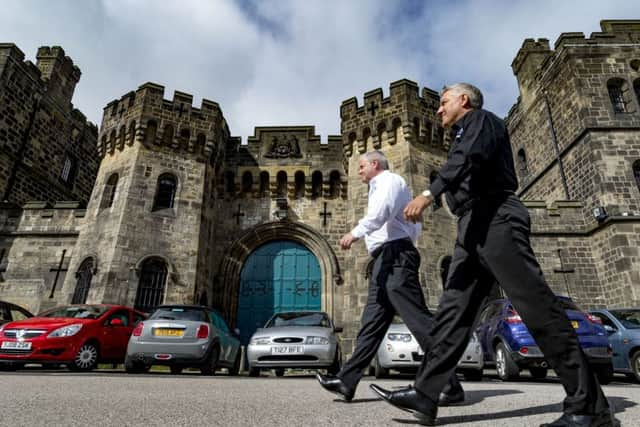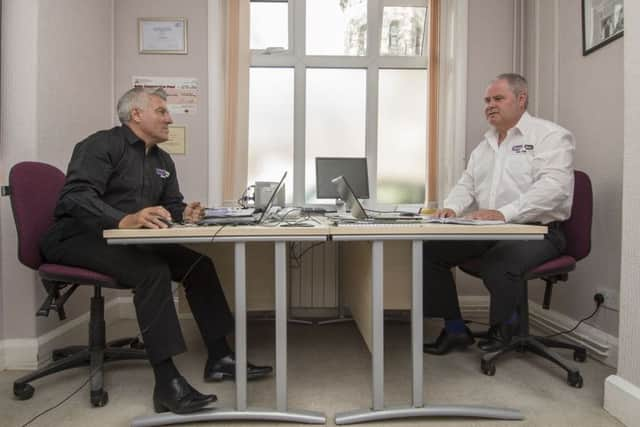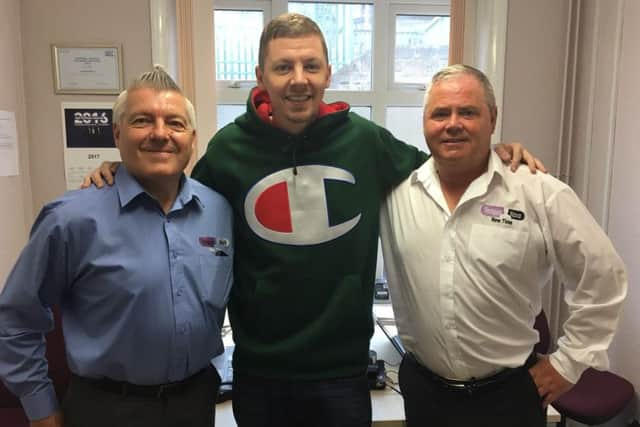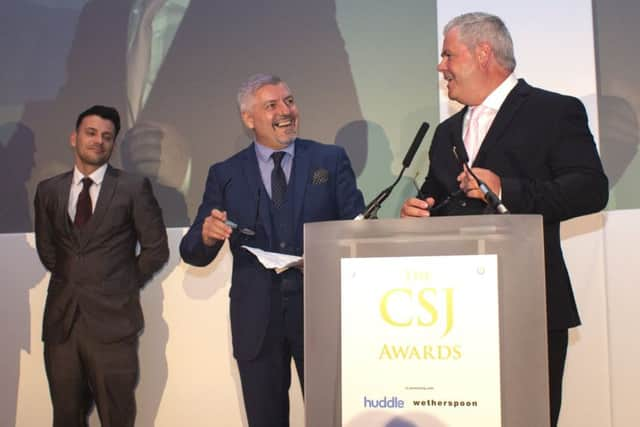Meet the former Leeds prison officers helping hundreds of ex-criminals get jobs - and saving taxpayers millions
For three decades working at Leeds Prison, Steve Freer and Val Wawrosz could only watch as countless inmates walked literally straight back out into a life of crime at the end of their sentences. “A lot of them come out of Leeds Prison and they are met by a drug dealer at the bottom of the hill,” Wawrosz explains. “What chance have you got in that situation?”
But a few years ago, the pair put their careers and reputations on the line by deciding to do what they could locally to change a national picture where almost half of prisoners end up back in prison within 12 months.
Advertisement
Hide AdAdvertisement
Hide AdNow the charity they set up in a small office overlooked by the jail in Armley in 2014 has helped 271 former convicts into sustainable work, with only 15 returning to custody – and the pair have just won a national award and a £10,000 grant for their pioneering work, which is attracting interest from prisons across the UK and around the world.


Wawrosz says it is often an inability to find secure work after leaving prison which pushes people back to offending after leaving with a small discharge grant.
“They get out of the prison gates with £46. Housing is a problem for them and we have heard of prisons letting people out with tents. Most of them have got somewhere to live but obviously some don’t. But job-wise, there is often nobody, there is nothing.
“The only people who can get a job are those going into family businesses and people whose bosses have known they have been inside but think they are so good they will have them back. The official figure is that about 75 per cent come out to no job but we think it could be higher.
Advertisement
Hide AdAdvertisement
Hide Ad“Of the thousands of prisoners I have spoken to, 30 to 40 per cent are in prison because they have come from poverty. They have been brought up in dysfunctional families, never had a parent or a role model, they have been in care, they have been sexually abused, turned to drink and drugs and then they are on the merry-go-round.”


The pair established their charity Tempus Novo – Latin for ‘A New Time’ – in 2014 in an attempt to break the cycle, working with employers across Yorkshire to encourage them to hire risk-assessed former prisoners and give them a second chance in life. The hundreds of prisoners they have now found work for had previously cost the UK economy over £200 million through keeping them behind bars.
Earlier this month, Tempus Novo won a Centre for Social Justice Award for their efforts. Their honour was presented by Justice Secretary David Gauke, who praised the charity’s “unique and hugely successful” model.
But while they are now receiving national acclaim, as well as interest from as far afield as Australia on how their concept could be replicated, it has been a long and difficult journey to this point for the pair.
Advertisement
Hide AdAdvertisement
Hide AdThey first met in 1990 when they first started working together at Leeds Prison, Val having worked previously at a Young Offenders’ Institution in Oxfordshire and Steve at Wormwood Scrubs where he had been looking after “some really hardcore criminals”.


Freer had been drawn to the career as his uncle had been a prison governor at Everthorpe YOI in East Riding.
“I used to stay with him and play football with the lads and thought they are alright, these lads, they are human beings. I looked into and saw it is not a bad job, there was good security, a career path and the pension is good. And I like working with people.”
But Wawrosz had a different story. Having worked his way up in the mining industry in his home town of Barnsley, he was among those to lose their jobs through the Government’s pit closure programme.
Advertisement
Hide AdAdvertisement
Hide Ad“Margaret Thatcher decided to close the pits and I was made redundant like thousands of others. I had no idea what I was going to do and just happened to see a job advert for a prison officer. I thought I quite like the look of that and will give it a go.”


The pair arrived at a tricky time for the prison. In 1991, one officer was convicted on assault charges after he reportedly punched and kicked several inmates, with two other officers acquitted of being involved with the beatings between 1988 and 1989.
Wawrosz says the pair “hit it off straight away” due to their more enlightened views towards dealing with prisoners compared to many of the colleagues, who had often been recruited from the armed forces. Freer adds: “It is no different to anywhere in society, like-minded people are attracted to each other. I saw Val going about his daily duties and prisoners liked him and would do what he said.”
Freer and Wawrosz formed a close bond as they initially worked together on a segregation unit for badly-behaved prisoners known as the ‘punishment block’.
Advertisement
Hide AdAdvertisement
Hide AdVal explains: “You saw some awful stuff, I could write a book. Everything that you can imagine that is violent, we have probably seen it.”
Their careers took them on different routes within the prison service but their paths crossed again in around 2012 when Freer was put in a charge of a prison-funded project inspired by then-governor Paul Baker to get serving prisoners work placements in the local community.
It something he took to immediately, doing research and networking with companies to try to persuade them to get involved. He was helped by Wawrosz, who was running a print workshop with prisoners in the jail which Freer would take business visitors to show the work ethic and potential of the inmates. But the scheme came to an end after 12 months when funding ran out.
Freer says: “I had found a vocation and when I went back to prison, I felt as though I had my arms and legs cut off.
Advertisement
Hide AdAdvertisement
Hide Ad“I went to see Val with my tail between my legs and told him ‘I’m back in prison next week’. Val said you need to keep doing this work, you need to carry on.”
They began using their dinner hours, spare time and weekends to look into establishing a charity to carry on the work.
But Freer says he was placed under investigation and transferred to work at Wealstun prison for six months after concerns were raised about meetings with ex-prisoners in the course of their research. Wawrosz says he was told he could also face charges and warned not to speak to Freer as the investigation took place.
Freer says: “I didn’t know whether I would have a job or pension to come back to. I now believe they were right to investigate it. I would have probably done the same thing with hindsight.
Advertisement
Hide AdAdvertisement
Hide Ad“But I could have been charged with gross misconduct or sacked. It is an unwritten rule you should not have contact with prisoners after they are released and there are good reasons why you don’t want to encourage staff to become too close to prisoners.”
However, the pair were still determined to go ahead with their idea and after being cleared of any wrongdoing, they managed to establish it in 2014.
After retiring as prison officers, they initially worked for the charity for free as it got off the ground. One of their key supporters was former Conservative MP Jonathan Aitken, who had become involved with prison reform work after being jailed for perjury in 1999.
Freer had previously been in contact with him as an admirer of Aitken’s involvement with a 2009 report called Locked Up Potential.
Advertisement
Hide AdAdvertisement
Hide Ad“I emailed him never thinking he would get back to me but he did, saying it was fantastic somebody has read it and please keep me posted,” Freer says.
“When Val and I decided to do what we were going to do, it was a no-brainer to ask him to be president, not just for his network but for his abilities and experiences. This is somebody who could have been Prime Minister but had also been in prison.”
Tempus Novo now has nine members of staff, is planning to open an office in London next year and there is interest in their scheme being rolled out nationally.
One of the people they have helped into work is Richard Welsh, who works for a Bradford company called Glidefield involved in making in air conditioning ducts. Welsh says after a series of spells in jail, he approached Tempus Novo for help after finishing his latest sentence for handling stolen goods in 2016.
Advertisement
Hide AdAdvertisement
Hide Ad“Nowadays, I just enjoy going to work. I don’t have to look over my shoulder, I don’t want that lifestyle any more. I have been in and out of prison since I was 15 and I’m 29 now. I have got a wife and kids to support. Tempus Novo have changed my life immensely. They should get more recognition than they do. I would probably still be committing crime without that job and their help.”
Welsh says it had been brilliant to attend the awards ceremony in London, which was influential politicians, journalists and philanthropists. “People gave me praise and said what you are doing is fantastic and my story was brilliant.”
Freer says the charity’s journey to this point has been an extraordinary one.
“It is exciting times, people are starting to take us seriously after five years. It is a unique world we are working in.
Advertisement
Hide AdAdvertisement
Hide Ad“We have created a service that has proved to be really effective and efficient for businesses and we actually have businesses approaching us.
“If you had said that to us five years ago, I would have had you drug tested. It has been a hell of a difficult path but one we were up for and believed in.
“We are about people and changing people’s lives. No amount of money in the world could give you that pleasure.”
Model ‘should be rolled out nationally’
Prisons across the country should adopt the Tempus Novo model, the chief executive of the Centre for Social Justice thinktank says.
Advertisement
Hide AdAdvertisement
Hide AdAndy Cook says: “Tempus Novo has made a timely and invaluable contribution to the work of prison officers in Leeds and around Yorkshire. CSJ research has frequently shown employment is key to breaking the cycle of crime.
“The dignity and confidence work brings is essential in giving hope to those who are leaving prison. We particularly admire the courage, determination and diligence of those working on the ground to instil hope in prisoners and ex-offenders, often in unforgiving situations. Their perseverance is an example for us all, and their innovative model should be emulated across the country.”